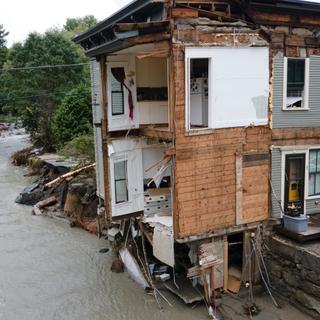


After a year of world records, heatwaves and floods continue to rage across the planet
Round-upAll continents are experiencing or have recently experienced episodes of extreme heat, drought or torrential rain. These are direct effects of human-induced climate change, exacerbated by the El Niño phenomenon.
Across all continents, the planet is burning, suffocating, drying out or, at the same time, drowning. For weeks, if not months, climate disasters have been unfolding and intensifying, striking all countries, sometimes concurrently, so much so that each day brings its own share of disasters. While France has generally been spared, its European neighbors, as well as China, the United States, Canada, and Siberia, are suffering from heatwaves, floods, droughts and fires caused by man-made climate change.
"I'm trying to keep the children's spirits up, but I'm not going to lie: We're dying, the heat is murdering us (...). It's like living in hell," Josh Vance, 43, a resident of Houston, Texas, told Agence France-Presse on Friday, July 12. The main city in the southern United States was hit by Hurricane Beryl during a heat wave, with heat index temperatures approaching 40°C. As a result, there were seven fatalities in Texas (and one in Louisiana), entire neighborhoods flooded, houses with facades and roofs torn off, and two million households without electricity, preventing refrigerators, fans, and air conditioners from working.
On July 7, more than 70 million Americans were under a heatwave alert, causing several deaths. That day, the thermometer registered 53.3°C in Death Valley National Park (California), an unprecedented high on that date, while a record was set in Las Vegas (Nevada), where temperatures reached 48.3°C. Among the memorable scenes: In New York on July 8, the mobile road bridge linking Manhattan to the Bronx had to be hosed down for several hours to unjam it, as the heat had caused the steel to expand.
Elsewhere in the world, the list of calamities is endless: In Canada, one of the 400 fires deemed out of control, spreading at a rate of 50 meters per minute, has led to over 9,000 people in the northeastern part of the country being evacuated since Friday night. In Russia, more than one million hectares of forest have gone up in smoke in recent days in Siberia and the Russian Far East due to an early and intense heatwave. In Central and Southern Europe, Romania, Croatia, Albania, Italy and Greece, people are suffocating under another heatwave, with temperatures approaching 40°C, up to 10°C above normal. The torrential monsoon rains, made more intense and erratic by climate change, have also affected more than 3 million people in northeast India and Bangladesh.
This sense of entering a new age of devastation is not actually new. June 2024 was the hottest June on record worldwide. It was the 13th consecutive month to break its own temperature record and the 12th month in a row to exceed pre-industrial averages by 1.5°C, the most ambitious target of the Paris Agreement, according to the European Copernicus Climate Change Service (C3S).
You have 59.68% of this article left to read. The rest is for subscribers only.










